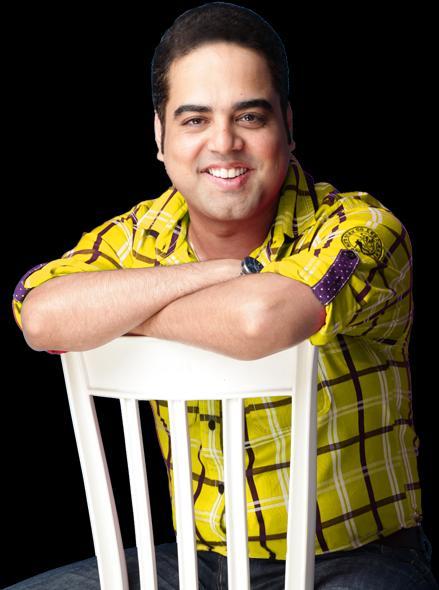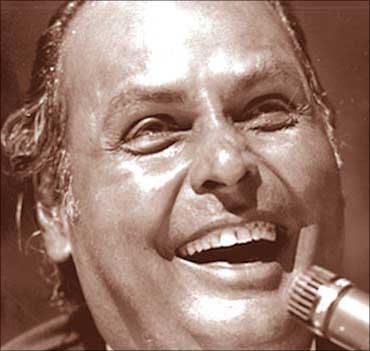Prasanna D Zore
Vineet Bajpai, successful entrepreneur and author, encourages Indians to move out their stable jobs and opt for the ups and downs of starting on their own. Here's why!
With just Rs 14,000 in his hand when he started his entrepreneurial journey, Vineet Bajpai today runs a business that generates Rs 25 crore in revenues. Starting from a rented generator room with just two computers and two employees in 2000 he built Magnon Solutions into a 200-employee company. In 2012 TBWA Worldwide, a Fortune 500 company, acquired a majority stake in the company.
Today, Bajpai, a management graduate from Lal Bahadur Shastri Institute of Management, is the group founder and CEO of Magnon/TBWA and Magnon E-Graphics, a digital media company.
Interestingly, in a span of two years Bajpai, who always had a desire to share the lessons he learned during his successful journey with India’s aspiring entrepreneurs, came out with two books on the subject: The Street to the Highway in 2011 and Build From Scratch which was published in 2013. His third book The Barbarian Manager is on its way and can see the light of the day soon, he promises.
“The first thing that I have attacked in my book is this age old, absolutely defunct and ridiculous belief that entrepreneurial careers are marred with risks and is like gambling,” he says attacking India’s middle class that deter their sons and daughters from becoming an entrepreneur, instead pressurising them to look out for a stable career.
“I would want to tell these young Indians that today entrepreneurship is a very respected, stable and viable career,” he says reflecting upon his own roller coaster ride as a businessman.
“I would want all aspiring entrepreneurs to know that you really have to start believing in your goals. The times have changed. The contemporary world is the time of the entrepreneur,” he says in his bid to encourage more and more youth to follow his bandwagon.
In an interview with rediff.com, Bajpai spoke about what made him a writer, how he built Magnon from scratch, what factors differentiates a successful company from ones that fail, the traits that define successful business tycoons like Steve Jobs, Dhirubhai Ambani etc and the pitfalls that budding entrepreneurs should watch out for.
What motivated you to write the book?
I started when I was of just 22, fresh out of B-School, with a total capital of Rs 14,000 I had saved from my first job at GE Capital. I started with two rented computers, in a refurbished generator room.
To supplement my income, I started teaching at some management institutes while my company was struggling. During my interactions I noticed a deep curiosity and desire among hundreds of students to know how entrepreneurship could be a career path. But those who didn't have an entrepreneurial background or a capital to back them up, had no idea of how to start up their own company.
I had the opportunity of being able to create a small company at that time with almost nothing and that is where I felt compelled that a lot of people wanted to follow the journey that I had followed and everyone should not have to reinvent the wheel.
That’s when I decided that my own experience of starting a company with almost no capital, not even a world-changing innovation like a Facebook or a Google, but just sheer passion to set up a company in the digital domain must be told. How I did it, what are the street smart, really practical things that aspiring entrepreneurs can do to start their companies from scratch without having too much capital or a business background.
That is how the idea came into my mind to write a book.
Why do you write only on entrepreneurship?
Both my books are basically meant to advise young entrepreneurs on how to really go about setting up companies and making them large organisations.
It has two important aspects: very strong management content, which is really technical business stuff, and it also has lot of inspirational content where the first thing I do is shake up a person to break free from the shackles of the Great Indian Career Management Syndrome which always taught us to get more and more degrees and purchase houses on EMIs.
The books tell people that you can do it and people who become big entrepreneur are not some extraordinary people, they are just people like you and me and give the reader the confidence that they too can do it. This was my deep desire of wanting to share everything that I have learned, every street-smart way of setting up an organisation which encouraged me to write the book.
How did you manage to find the time to write these books?
When you are really determined and committed about something you will always be able to find the time, that extra source of energy within yourself to be able to fulfil your passion. I really wanted to share my experience with India’s youth and which is why I was probably able to do it.
To put it more practically I don’t watch movies on weekends.
'The company that started with two rented computers employs 200 employees between Delhi and Mumbai with full service offices'
Image: Book cover of Vineet Bajpai's Build From ScratchIn terms of revenue how big is your company now?
It should be doing about Rs 25 crore (in revenues) this year.
Your business model...
We are a comprehensive digital agency where we offer single window digital media solutions to our clients. Right from the creative aspects of digital business to high-end technology applications to mobile ads and solutions to content management systems to search and social marketing and social media optimisation and infrastructure support services. So, basically we do everything that helps brands become brands in the digital medium.
'For any entrepreneur the ability to hang in there when other people would have left is what makes the difference'
Image: Reliance Industries founder Dhirubhai AmbaniPrasanna D Zore
What did you do right that made you successful?
One of the things that really helped us was our ability to hire and retain high quality talent who could dream with me. Also, the fact that we started up really early in our careers also helped us.
Let me answer this question little differently. Out of the five things let me list out the first three. They are people, people and people.
I think the first thing that an entrepreneur, not just in digital space but any industry, has to believe is that he or she is a nobody, and a non-possibility without being able to create a solid management around him; a set of people who are, as the English saying goes, are more loyal than the king. You have to find people who are more loyal to your company than even you are, people who see that collective dream, share your vision and people who are going to be with you during the roller coaster ride of setting up an organisation when it is on its ups and downs.
I think the first thing that drove Magnon’s story and now Magnon TBWA is that we were able to create some fantastic people with us.
To come to the fourth point, a lot of people forget that they get very product-centric or service-centric and they fall in love with it and forget that the end point of every business or the objective is commercial success.
Revenue orientation right from Day One and eventually profits for your business is an absolute essential. So an entrepreneur’s revenue orientation is the fourth thing that can make or break a business.
And the fifth is, which I have also mentioned in my book Build From Scratch, is a Hindi phrase called ‘Antaragni’, which means the fire within.
It is an inexplicable drive that an entrepreneur carries which enables him to crossover any insurmountable challenges including sacrifices in personal and professional life, the ability to take risks, convert threats into opportunity; there is no explanation for it, so you look at a Richard Branson or a Steve Jobs or a Bill Gates or a Dhirubhai Ambani, there is one central driving power in all successful entrepreneurs which I have termed Antaragni, the fire within.
Antaragni cannot be described completely; it can only be felt.
Common qualities that connect great entrepreneurs…
First is the ability to depend on people, respect and appreciate that success can only be achieved as a team and not by one-man show.
The second is revenue orientation.
Third is perseverance. There is a saying by Steve Jobs which says that 50 per cent of the times what differentiates successful entrepreneurs from failed ones is just perseverance.
During the course of my career, I have seen two recessions. When we started in 2000, we were in the Internet business and that year saw the greatest dotcom bust that the world has seen. And then again in 2009-10, when the US economic meltdown affected the world. I think there must have been ten times during the journey that logically anybody else would have just moved on but I think, not just for me, but for any entrepreneur the ability to hang in there when other people would have left is what makes the difference.
The last thing I would say is the ability to go for an infinite dream.
'The most important lesson is to have an undying belief in what you are doing'
Photographs: Book cover of The Wave Rider by Ajit Balakrishnan
Could you list out things that can make or break a start-up?
When you read Build From Scratch, there is a list which says '30 risks that a start-up faces'. Let me read out the first few for you.
The first is the risk of choosing an unsuitable business domain; the second is the risk of drawing up a faulty business plan; the third is risk of being unable to raise capital and resources to start the business; the fourth is the risk of legal non-compliance due to lack of information; fifth is risk of overspending on start-up infrastructure; sixth is risk of recruiting the wrong set of people for crucial positions, and seventh is the risk of unexpected gestation period.
What did you learn from your entrepreneurial journey?
The most important lesson is to have an undying belief in what you are doing. A lot of times people start businesses as a side business. They continue with their job and fiddle around with this side business. Then there are people who also work on a business only for six months thinking that they will return to their jobs if the idea doesn’t work out for them. This approach is a recipe for disaster.
The first and foremost thing I have learned is that long-term commitment is the first essential ingredient for the success of a company or an entrepreneur.
A lot of people see Amazon which is valued at billions of dollars but I am sure when Jeff Bezos started out he did not start out with this monetary dream. He started out with a dream to create a paradigm in online retail.
If I have to take an Indian example, then Deep Kalra started makemytrip.com, not with a short-term goal but with the desire to change the way Indian travel industry works. He gave the 10 or 15 years to his company to create the company that he has created.
When I started Magnon I had decided that this is what I am going to be doing for the rest of my life and I will burn all my other bridges and keep walking this path. I think a long-term intent is very essential. That is something I have learned from people around me, in great success stories and in my own story too.
The second is as I said an entrepreneur has to really stop thinking that he is the best in everything. He has to be able to start with not just delegate but also depend on people. A lot of time entrepreneurs are able to get a small organisation going by their own sheer will power and hard work but one can only build a small company by powering it yourself.
But big, successful organisations are built when more people are involved and when decision-making is decentralised.
I think the ability to trust people, train them, make them believe in a collective dream to generate revenue is something that every entrepreneur should learn. While this sounds very simple you cannot imagine the number of entrepreneurs who fail because they feel that revenue will follow once they set up a small business. This never happens.
You have to start your business with an eye on revenue. Every step that you take, when you buy a computer, when you rent space, you need to be very clear as to how this is going to generate revenue quickly. An undying commitment, a hawk-eye focus on revenue is something that every entrepreneur must learn.
What will be your advice to India’s young entrepreneurs?
There is a whole chapter in Build From Scratch on this point. The first chapter is called Entrepreneurship: Welcome to the Jungle. The chapter deals with what actually happens in our homes, drawing rooms, on dining tables. While sitting with his father an aspiring entrepreneur announces that ‘I want to start my own business’. 90 per cent of Indian middle class homes are shocked and appalled and wonder what’s wrong with you. They go: you got to have a job, a family, you are going to destroy the family.
The first thing that I have attacked in my book is this age old, absolutely defunct and ridiculous belief that entrepreneurial careers are marred with risks and is like gambling.
I would want to tell these young Indians that today entrepreneurship is a very respected, stable and viable career.
I would want all aspiring entrepreneurs to know that you really have to start believing in your goals. The times have changed. The contemporary world is the time of the entrepreneur.
The amount of employment being generated by entrepreneurs, the economic growth that they are helping generate, every success story that we hear, right from successful business magazines in India to a huge success in the US called Twitter, there is an entrepreneur behind each initiative.
Today, entrepreneurship is the greatest career driver one can hope for.





Comment
article